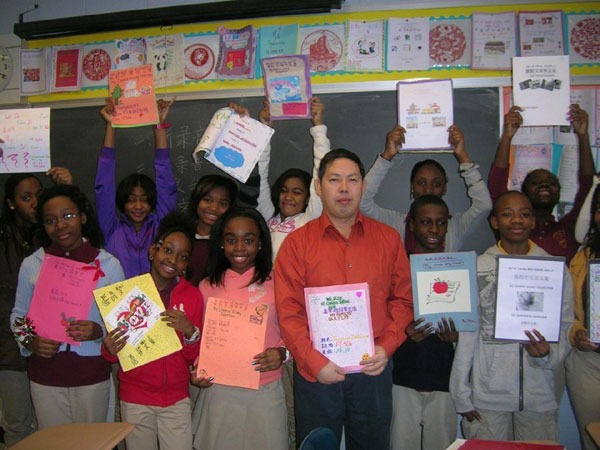Jackie Chan as catalyst
Wu's main goal is to teach them to love the language, and a roomful of students sang her praises. "I love Chinese. Laoshi Wu's very fun the way she does it. She says a poem out loud and we repeat her and then, after one sentence, we clap and make a dance out of it," said Javia Richardson, 11.
"One of the songs was "Welcome to Beijing", and we saw the movie and she asked how we felt about it and everybody's going crazy because of Jackie Chan," she said. "I thought it was going to be very hard and the characters would be very hard but, once you learn, it's very easy to understand."
"The idea is to first get them interested in the language and, through songs and dance in Chinese culture, it's easier to keep them interested," Wu said. "First it's fun and easy, then in seventh and eighth grade, they go on to more academic learning. But they still remember the songs in 11th and 12th grade."
In seventh and eighth grade, the curriculum is more project-based on subjects such as the weather and what kinds of clothes should be worn on different days. There is also an art class once a week in seventh grade.
Role-playing and technology are incorporated into the smaller ninth- and 10th-grade Advanced Placement classes. "We want to teach them five skills - reading, writing, speaking, listening and typing," said Yuhang Michael Jiang, who formerly worked at IBM. Jiang also began a Chinese chess club, which Sadiki Wiltshire described as "very, very interesting" and "much more warlike" than American chess.
Involving mom and dad
"My parents are very happy I'm learning Chinese," said Angelique Torres, 11, who also is conversant in Spanish. "The hardest things in Chinese are the tones and characters and the pronunciation of the characters."
"They are bowled over with the Chinese, just blown away," said Adilifu, the assistant principal, who has been at the school for eight years. "The parents support us 100 percent on back-to-school night and we have an 'Attend School With Your Child' day."
Wu said the students "read to the parents even if they don't understand, so they involve the parents and extend the learning when they're home. A lot of them want to go to China to study."
With only two Chinese students in the school, the parents can't help their children with their language learning. "They don't go home and listen to Chinese, so they have to hear it in the classroom and have it repeated often," said eighth-grade teacher Baozhong Ye, who tries to teach real-life applications such as the weather and food price comparison.
|
 |
|
Baozhong Ye's students use 200 to 250 characters in each of their projects, and Yuhang Michael Jiang makes technology part of his classes. |
|
|
|
Baozhong Ye's students (top left) use 200 to 250 characters in each of their projects, and Yuhang Michael Jiang makes technology part of his classes. |
How program works
The Confucius Classroom program, which is almost 2 years old, reaches nearly 25,000 students in 27 states and the District of Columbia. It is only in schools that already have Asian language studies.
Resources such as DVDs, professional development, free interaction, a newsletter with 7,000 subscribers, and a National Chinese Language Conference provide growth opportunities, according to Livaccari, the Asia Society's education director.
Programs are flourishing in such unlikely places as Oklahoma and Utah, Iowa and New Hampshire, West Virginia and Texas. "That's the great sea change," Livaccari said. "It's become incredibly diverse, available to all students across the board. There are great opportunities and challenges to a wider audience in the last five to six years."
Livaccari said the Confucius Classroom program is focused on the big picture. "China is going to be very important in the future, and what I like about the Chinese language is its interesting features (characters, tones) and the cognitive skills needed. In addition, the tradition of culture is an alternative to the eurocentric vision of the world."
Livaccari, who speaks Chinese, Japanese and some Korean, said, "The basic grammar is very simple to learn. It's easier than Spanish, French and German. You can learn any language if it's presented in the right way."
Each of the Confucius Classroom programs also works with a sister school in China on various projects. The Medgar Evers counterpart is in Jinhua in East China's Zhejiang province.
What makes Medgar Evers a perfect environment is its unique approach. "We don't follow the traditional middle school model," Adilifu said. "We focus on an accelerated high school prep-early college program where students can take six to 15 credits at (neighboring) Medgar Evers College. We have our kids prepared to take the high school Regents (exam) in the eighth grade, which is not common in the city."
Nor is such performance common in a school, like Medgar Evers, where 80 percent of the students qualify for a free or reduced-price school lunch. These children do not come from privileged backgrounds.
Livaccari said he thinks learning Chinese "empowers students greatly" and is an asset in applying to colleges. "It also can raise their self-esteem to achieve across the board. Doing well in Chinese can redefine them and the image they have of themselves."
